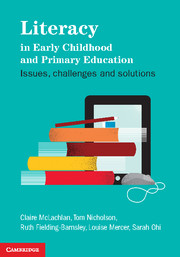Book contents
- Frontmatter
- Contents
- List of figures
- List of tables
- About the authors
- Acknowledgements
- Chapter 1 Introduction
- Part 1 Literacy acquisition: the child, the family and diversity in the modern world
- Part 2 Learning about literacy in early childhood settings
- Chapter 7 Effective practice and the role of teachers in supporting literacy
- Chapter 8 ‘Sound’ foundations for learning literacy
- Chapter 9 Uses of assessment before, during and after transition to school
- Part 3 Literacy learning in the primary school
- Part 4 Literacy learning in the senior primary school
- References
- Index
- References
Chapter 8 - ‘Sound’ foundations for learning literacy
from Part 2 - Learning about literacy in early childhood settings
- Frontmatter
- Contents
- List of figures
- List of tables
- About the authors
- Acknowledgements
- Chapter 1 Introduction
- Part 1 Literacy acquisition: the child, the family and diversity in the modern world
- Part 2 Learning about literacy in early childhood settings
- Chapter 7 Effective practice and the role of teachers in supporting literacy
- Chapter 8 ‘Sound’ foundations for learning literacy
- Chapter 9 Uses of assessment before, during and after transition to school
- Part 3 Literacy learning in the primary school
- Part 4 Literacy learning in the senior primary school
- References
- Index
- References
Summary
Chapter objectives
To examine if the predictors of literacy acquisition can be promoted in early childhood settings.
To explore specific teaching strategies which have proven effective in promoting literacy knowledge, skills and dispositions.
To critically examine the roles that teachers and parents play in ensuring continuity of literacy learning between the home and early childhood setting.
This chapter examines in depth how teachers and families can support alphabet knowledge, phonological awareness, vocabulary, comprehension and emergent writing prior to school entry, as well as ways in which teachers can support continuity between home and centre literacy learning. Recent research on how to integrate phonological awareness into holistic educational programs during the early years is also considered. Drawing on Nicholson’s (2005) work, guidelines for the scope and sequence of teaching phonemic awareness in early childhood are provided. Finally, the chapter explores approaches to storybook reading, supporting socio-dramatic play and emergent writing as crucial vehicles for supporting foundational knowledge and skill development.
A starting point
If we return to the National Early Literacy Panel Report (NELP) (2009) and revisit the six evidentially based predictors of literacy achievement, we have a starting point for examining what teachers need to promote in early childhood.
- Type
- Chapter
- Information
- Literacy in Early Childhood and Primary EducationIssues, Challenges, Solutions, pp. 121 - 139Publisher: Cambridge University PressPrint publication year: 2012



